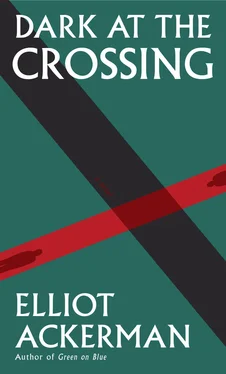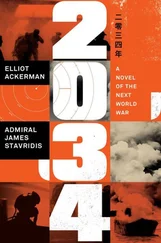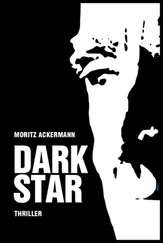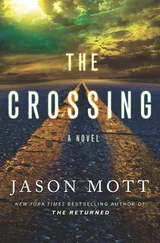—
The air cooled.Haris strained to hear over the wind. Then Athid surprised him, flopping down on the trailside. He brought his face close to Haris’s, speaking in a whisper: “It is unlocked.”
Sweat beaded on Athid’s forehead, running in rivulets over each temple. Haris felt afraid and nodded once.
Running in a crouch, they moved quickly across the broken field. Haris’s footing felt uncertain and mud caked to his boots, his feet becoming heavier with each step. He couldn’t see a thing, whereas Athid moved with total certainty, never slowing. Then Athid collapsed to his knees. Haris toppled into him in the darkness. After untangling himself, Haris also stood on his knees. Athid bent over the manhole cover that sealed the culvert. With a jerk from his legs and back, he lifted and tossed it aside.
A warm, decomposing smell belched up from the earth. Athid lowered himself underground. When he stood in the culvert’s bottom, its mouth came up to his chest. He glanced back, looking for some assurance Haris would follow. Haris took off his heavy pack and stood at the opening’s lip. Athid dipped below, and Haris trailed after him, ducking underground.
On their hands and knees, and at times on their stomachs, the two crept toward the border, dragging their packs behind them. The sloshing of stagnant water and the scampering of subterranean creatures were the only sounds. Athid cursed as the sharp smells became unbearable or as a rat or something else brushed by his leg or over his arm. Haris reached up and touched the sides of the culvert. They felt cool and hard, like cement. Beneath his palms it was all mud.
Haris crawled on his left side. Soaked from the waist down, he did his best to protect his right pocket, which carried his fold of cash, passport and map. Miserable as the passage was, he felt glad for it. To cross into a war should be difficult, he thought. To fight in a war should be even more difficult. When he’d been in Ramadi, that most violent of cities, the war had felt easy. The American soldiers he had translated for would tape a half pound of explosives to a door, blow it in, find the person they were looking for, maybe kill that person, maybe capture him and then return to their firebase at Hurricane Point, a peninsula jutting into the Euphrates River. They’d leave after dinner. They’d return before dawn and have breakfast, watching television and lounging on La-Z-Boy recliners flown in from the States, the sweat still on their uniforms. They would kill someone and in the morning they’d eat cornflakes together.
Traveling through filth and darkness, Haris thought he might find what he was looking for on the other side. And he was happy.
—
Haris tuggedhis pack by the handle, grunting, becoming short of breath. Every few minutes, he’d tap Athid on the back, needing to rest a bit. Then they’d continue to plow through the water and filth. The culvert was several hundred meters long, and progress became difficult to measure. They moved in a straight line, but Haris wondered if it was possible to get lost on a straight line. Again he glanced at his watch, knowing he wouldn’t be able to see its face.
A hoop of light sliced into the culvert from a sealed manhole cover above. Had they been traveling for that long? Haris couldn’t believe morning had already broken. Athid stopped, his neck craning toward the light. He gazed back at Haris. Both their faces were layered in sweat and grime. Haris glanced upward. Athid had kept his word, taking him this far. Haris returned his look with clear, wide-open eyes. Athid’s eyes had become heavy-lidded with fatigue. Composting earth flecked the growth of his spongy beard, and it seemed as if a liquid filth might be wrung from it. He considered Haris for a moment further, then frowned. Coming to a squat, Athid bounced on his haunches and then exploded upward, lifting the manhole cover.
Light rushed in.
Not looking back, Athid vaulted from the culvert.
Before Haris could follow, a pair of blue-sleeved arms reached beneath the earth and grabbed him under the shoulders. Haris flailed against their grip, lunging belowground. He struggled to free himself and almost broke loose. Then another set of longer arms clutched after him, joining the first. Haris grabbed the drag handle on his pack, hoping its weight might anchor him inside the culvert. It didn’t work. As he was lifted up, light washed against his face, blinding him. But it wasn’t daytime. The glare didn’t come from above but from the side. Headlights.
The blue-sleeved arms pinned him down. Haris glimpsed the two chain-link fences of no-man’s-land. He called out for Athid. No reply. Framed in the glare, two silhouettes moved swiftly against him — one short, the other tall. They cursed at him in Turkish. The headlights caught the stubbled faces of the gendarmes.
Haris offered his hands so they might cuff his wrists, but they didn’t. The taller gendarme knelt on his chest. Haris now faced the sky and the night above. The short gendarme groped at his pockets, grabbing after his valuables. Haris bucked wildly. “Don’t!”
“Stay still, you damn fool!” the gendarme shouted in Arabic.
Haris got an arm free. He struck the taller gendarme across the face. It wasn’t enough to knock him from Haris’s chest. Instead, the gendarme rolled his jaw and unholstered a strange-looking pistol. Haris glimpsed the plastic barrel. It fired with a click instead of a bang. A fanged bite sunk into Haris’s skin, just beneath the ear. He felt the puncture, then his whole body seized, the Taser’s ten thousand volts pulsing through him. His eyelids cramped shut. He smelled his burning flesh, felt his skin turning hotter than his blood.
Everything released.
Haris exhaled, his breath tasting like warm ash.
The taller gendarme dismounted him. He ripped the Taser wire’s teeth from Haris’s neck. The shorter gendarme finished rifling through Haris’s pockets, taking his cash, passport and map. Haris tried to stand, to come after them, but he couldn’t. His body refused him, remaining limp on the soft ground.
The headlights shut off. Perfect darkness returned.
Only Haris’s eyes would obey him. He looked frantically for Athid, but found him nowhere. Lying on his back, Haris glimpsed the dome of stars above. Mixing with the stars was galaxy dust, the type which could only be seen far from a city. And Haris felt completely alone.
Standing somewhere above Haris, the two gendarmes argued in Turkish, presumably about what to do with him. Slowly Haris felt his senses recovering, but he didn’t move. He hoped the gendarmes would leave him. Soon their chatter stopped. Their footsteps fell into the distance. Haris shifted his eyes in that direction, but he couldn’t see through the night.
A car door opened where the gendarmes had disappeared. Haris managed to turn his head toward the sound. The overhead light flashed on inside the cab of a truck. Haris saw a black parka, a red Che T-shirt. Saied’s head was hunched down as he thumbed through a wad of cash handed to him by the shorter gendarme, and on the seat next to him sat Bashar the dog. Startled by the flash, Saied glanced up, staring into the darkness. Before Haris could read the expression on his face, the taller gendarme turned off the overhead light.
Haris rested his head in the mud, easing into the earth. He watched the galaxy dust and waited for his body to return to him.
He had nothing now, not a map, not money for travel. He lay sprawled on his back in no-man’s-land, and weakness sewed his body to the earth. By morning he’d regained the strength to climb back into the culvert. His hiking pack was no longer there. They’d taken it, too. Enough light found its way underground so he could see the filth he’d waded through the night before. As he retraced his path, crawling past the subterranean creatures, they didn’t scamper away from him. The rats stared back from their nests, the insects held in their swarms. They stood their ground, refusing him a place in their world.
Читать дальше












